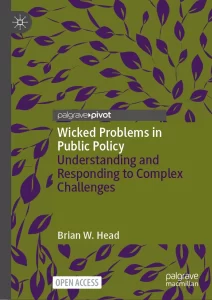Defending evidence-informed public policy
By expert contributor Professor Brian Head FASSA FIPAA

The positive advantages of using good evidence to develop and implement public policy are widely recognised. But they have been heavily disputed in recent years owing to the ideological stance of populist political leaders. Moreover, some of the core capacities in public service agencies to undertake strategic policy advising have arguably been undermined by three decades of hiring consultants and outsourcing service delivery.
Government leaders, senior public servants and international organisations have regularly endorsed evidence-informed policy-making (EIPM). However, in modern policy-making, evidence-informed approaches often come up against political obstacles in addressing complex policy issues. The first year of President Trump 2.0 suggests that it’s a global challenge.
The supporters of evidence-informed approaches claim it is essential to build a solid and diverse evidence base for better decision-making and improved performance. This perspective gained considerable momentum among OECD countries over several decades. Specialised units were dedicated to gathering and analysing economic, social and scientific information, at both national and international levels. It was often accepted that rigorous program evaluations should be more widely used. Processes were also developed to ensure that information about complex topics from many sources was better shared and coordinated, ensuring that policy advice could draw upon the best available evidence.
Progress was very uneven, of course, but there was widespread optimism a decade ago that an expert-driven form of policymaking, moderated by community consultation, could demonstrate its value for improving outcomes.
This trajectory was slowed by several well-known obstacles, variously linked to gaps in knowledge, funding and communication — matters that could be in principle be addressed and improved. These obstacles included:
- Knowledge gaps: Rigorous research findings were not (yet) available in many areas to inform policy decisions. Knowledge about the underlying problem might not be matched by knowledge about feasible and effective solutions and their implementation requirements.
- Low uptake of available research evidence: Research utilisation has been patchy. Research “supply” was seen as greater than “demand” for evidence by potential users in government. Ministers and policy managers may focus on building external support (from stakeholders and partner organisations) alongside any interest in the evidence base.
- Expert knowledge was not well-targeted and communicated: Suppliers of expert knowledge (e.g. scientific reports) were not adept at packaging and communicating their findings, and did not understand the immediate practical needs of policy and program managers.
- Diversity of relevant knowledge and experience: Knowledge is fragmented. Choosing the best evidence, or the best “mix” of knowledge, is inherently difficult. There are many forms of policy-relevant knowledge, ranging from experimental science, systematic evaluation, the professional judgements of managers and service providers, through to the experiences of stakeholders and clients.
- The ‘trustworthiness’ of the sources of evidence: Policy decisions are made in situations where inputs are available from diverse sources. Decisions do not wait until evaluation research has generated a high level of scientific certainty. Hence, the credibility of the source is crucial, especially under conditions of uncertainty and contestation. Credibility is sometimes linked to scientific expertise, but sometimes it is also linked to other criteria such as political alignment.
The champions of evidence-informed policy saw these five challenges as manageable – through high investment in knowledge production and synthesis, together with greater use of collaborative processes and knowledge exchange networks.
However, a sea-change in this optimistic sentiment emerged in the decade between the global financial crisis and the COVID-19 pandemic. The hopes and expectations concerning evidence-rich policy processes were quickly challenged and deflated by debates about diverse crises, and by the rise of several prominent populist leaders who had no interest in objective evidence or a scientific consensus. Basic facts were no longer agreed among rival groups. Where would this leave the policy advisory system?
Getting back to basics
To better understand this shift in momentum, scholars have returned to some basic questions – what are the conditions required to build and protect the quality of decision-making in democratic systems of governance? In response to recent challenges, evidence-informed policy-making must go beyond exploring its core topics such as the quality of evidence, the analytical skills of policy professionals, the wider dissemination of reliable information, and transparency in decision-making. We must address the inherent tensions between expert-driven approaches to decision-making and the democratic accountabilities of political leaders whose world is necessarily focused on stakeholders and public support.
Political culture is important. In some countries with populist leadership, including the US and Hungary, the political executive has deliberately chosen to weaken or undermine EIPM, encouraged by populist hostility to knowledge ‘elites’. Even where populist ideas have not become dominant, there has been a trend toward the narrowing of policy advice — especially if ministers assert political control via a small circle of appointed policy advisors. Some wider features of the policy environment reinforce the challenges for evidence-informed analysis, including distrust of politicians and political institutions; intense partisanship and polarisation; and values-based opinions disseminated through digital media channels.
Under these conditions, how can evidence-informed approaches to complex policy problems be advanced? Complexities and controversies are now widely found across many policy areas. Modern policy-making requires engaging with the value differences that underpin the intractability of many policy issues. Complex inter-related social issues increase the challenges of mobilising adequate knowledge and competent coordination at all points in policy design and program implementation.
Evidence under fire
Evidence alone cannot provide ‘the solution’ for deeply divisive problems. Evidence is crucial for mapping socio-economic trends, documenting the diverse positions taken by stakeholders, and providing evaluation findings for certain policy options. However, in a controversial policy field, the necessary trade-offs and conflict resolution mechanisms can only be managed through the political process, and thus require adroit leadership.
In turbulent policy fields, relevant evidence itself is contested. Defining the options and consequences becomes a ‘framing’ contest between the proponents of various positions. If evidence is being selectively used to consolidate positions, there is little chance of developing agreed bodies of research evidence about ‘what works’. And so, if we can’t agree on the evidence, how can we use knowledge and experience to inform public policy and administration?
Future efforts
In conclusion, the future of EIPM depends not only on the commitment of skilled policy professionals but also on the leadership qualities and problem-solving capacities of the senior decision-makers themselves. They need to work in tandem with evidence-informed policy analysts and advisors in several relevant sectors.
If complex and wicked problems cannot be resolved by appeals to evidence, where can useful and constructive new ideas come from? Public officials tend to be tightly constrained by risk management concerns and established routines. Encouragement of new participatory processes, such as deliberative juries or multi-stakeholder policy design workshops, would require political authorisation at a high level. Innovative ideas may emerge from policy entrepreneurs and analysts in think-tanks, research networks, NGOs, the media and business associations. New ideas often gain initial traction outside government departments, before being considered and adopted within public agencies.
The challenging policy environment encourages a more realistic consideration of the levers available for policy learning via strengthening and institutionalising EIPM. Steps are needed to strengthen investment in information systems and analytical skills. Reducing the reliance on external consultants, and rebuilding strategic policy capacity within the public sector, would be beneficial. Learning from past experience is always helpful, primarily through policy reviews and evaluations, which would ideally draw on a wide array of stakeholders and experts. A focus on future-oriented problem-solving for complex and wicked problems may benefit from participatory processes for learning and deliberation. In every instance, commitments to the value of good evidence and open debate must be considered within each agency, across the span of public sector agencies, and in building bridges with other sectors.
Want to challenge your thinking?
Read the book Wicked Problems in Public Policy: Understanding and Responding to Complex Challenges by Professor Brian Head
About Professor Brian Head
Professor Brian Head has been a distinguished scholar at the University of Queensland since 2007, following a diverse career spanning senior roles in government, academia, and the non-government sector. A prolific author and editor, he has contributed extensively to the fields of public management, governance, social issues, and environmental policy. His research focuses on evidence-based policy, tackling complex or ‘wicked’ problems, program evaluation, early intervention and prevention strategies, collaboration and consultation, public sector integrity, and leadership. His work bridges the gap between research and practice, fostering stronger connections between the academic and policy-making communities.
His most recent publication, Wicked Problems in Public Policy (2022, Palgrave, open access), provides the first comprehensive overview of the ‘wicked problems’ literature. These problems are characterised as complex, open-ended, and intractable, with contested definitions and solutions. Drawing on examples from social, economic, and environmental fields, the book explores why these issues attract significant attention and examines how policy practitioners can better understand and manage them. It critiques traditional public management approaches and highlights the need for integrative and inclusive strategies to address the multiple interests and complex causes of wicked problems.

